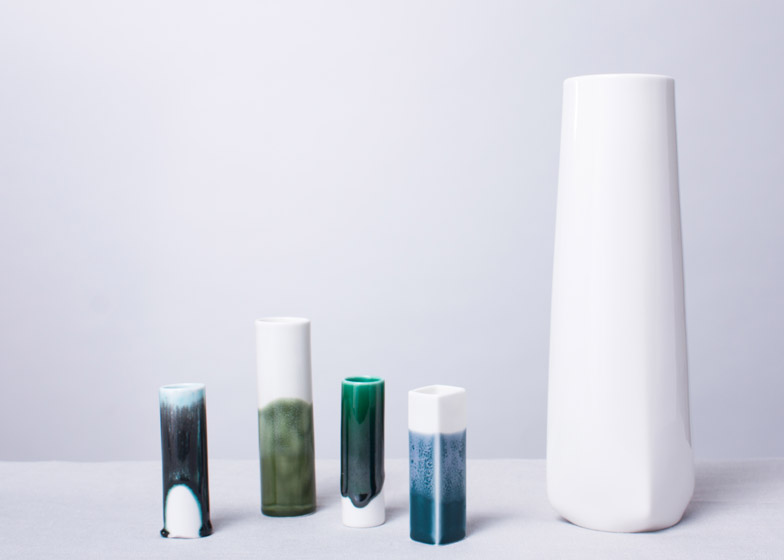London Design Festival 2015: Japanese ceramics designer Reiko Kaneko will show the results of three years of experimentation with porcelain glazing at this year's London Design Festival.
Kaneko moved from London to the city of Stoke-on-Trent three years ago to hone her craft and is now showing the results of her experimentation for the first time.
Her Exploring Glaze collection comprises simple geometric white china forms overlaid with multiple reactive glazes, in a range of colours influenced by Japanese stoneware.
Kaneko described the glazes as having "their own life". "The patterns they create have a familiarity to me, of moments in nature," she explained.
Bone china is rarely glazed and was traditionally a white background for intricate hand-applied decorations and guilds.
"I've been told that it's heresy to glaze on top of this prized whiteness," Kaneko told Dezeen. "But I just think it's a good background for the colours to stay true."
"It doesn't take away from the quality of the body and I also tend to leave white areas, which gives this striking contrast between the white and colour."
The pieces are slip-cast, a process that involves pouring liquid clay into a mould and allowing it to harden. Each then goes through at least three firing processes, with oxides to provide colour and fluxes to control the melting points.
Glazes are more typically used on porcelain and stoneware, which are fired for a second time with the glaze on at a higher temperature than their initial "bisque" firing. The higher temperatures bring about reactions in the glaze that create strong colours.
Bone china's glaze firing is at a lower temperature than its initial bisque firing, so creating strong colours in cooler conditions is a challenge.
"Getting any reactive work at all at lower temperature was the first focus, and as things developed I would fire items over and over again to get interesting results," said Kaneko.
Related content: see more stories about ceramics
"The fun in glazing is that it is chemistry – just glass over ceramics, but it is absolutely unpredictable when the elements are combined and that makes mistakes incredibly fascinating at times."
Since moving to Stoke-on-Trent – renowned for its pottery and ceramics – she has been perfecting this technique.
"A ceramic cluster from the industrial era is a unique heritage; information is in the air and I'm constantly calling on people with huge experience and knowledge – and patience," she said.
"It's been a steep learning curve and I've left a trail of failed experiments and processes that didn't work out. But it's enabled me to build up my own experiences with ceramics and its influence on my practice has been about that physical testing and understanding through trial and error."
The Exploring Glaze exhibition will take place at the Elementary store on Redchurch Street in east London – part of the Shoreditch Design Triangle – during the London Design Festival from 19 to 27 September 2015.

